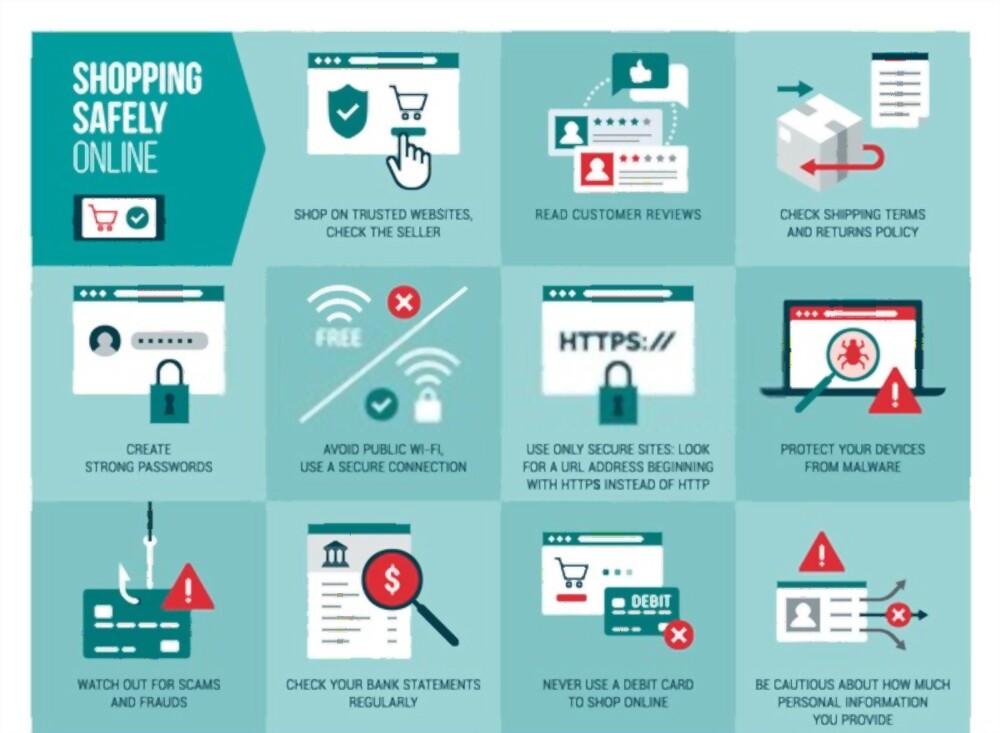Online shopping in Uganda is steadily becoming very popular, with many Ugandans now preferring shopping online to offline shopping. The online shopping culture among Ugandans is slowing a new normal.
If there’s one thing Ugandans are good at, then it is copying and imitation. The moment online shopping because a thing in Uganda a few years back, it immediately started trending, and now no one wants to be left behind.
Ecommerce sites in Uganda have been smart enough. Many sites are using the rising breed of local socialites and celebrities who are on a mission to make money from advertising their products and influencing their sales. The fans of these socialites end up visiting the shopping stores and purchasing products such as phones, laptops, computers, clothes, shoes, jewelry, makeup, hair etc.
The online shopping business in Uganda has skyrocketed just like that. However, shopping online in Uganda is not all gold and glitters as it appears on the outside; naughty scammers and fraudsters have identified loopholes in online stores in Uganda and are ripping off unsuspecting victims their hard-earned money. This has made online shopping in Uganda unsafe. In this write-up, I will discuss tips to help you stay safe while you shop online in Uganda.
Also read; 5 Ways to Shop More Securely Online in Uganda
Types of online shopping scams in Uganda
1. Fake products
This is the most common online shopping fraud in Uganda. In this type of scam, the buyer isn’t aware that they are being sold fake goods, only to end up being duped. For example, someone can advertise a replica of the iPhone 13 Pro Max and claim it is genuine. This fraud cannot be detected online since photos of a genuine product are used in advertising the fake product.
2. Lack of delivery of goods paid for or ordered for
Here, a buyer pays for a product and doesn’t receive it. Imagine how frustrating it can be to pay for your product, which never gets delivered, and worst of all, you never hear from the seller again! Trying to recover your money lost in such a scenario can be difficult. That is why you must get enough knowledge that will enable you to avoid falling for such scams.
3. Fake discount gift cards and coupons
These are good to be true deals. Scammers advertise products at prices way below the market price, sometimes with unbelievable discounts. Example: “Take this survey and win an iPhone”. Usually, there will be no iPhone to win, but instead, they might end up tricking you into giving in your info which they would steal.
4. Advance delivery fee scams
In this case, a scammer advertises an item online, usually on social media or classified sites like Jiji Uganda. When you pick interest in the item, the scammer will ask you to send them delivery fees so they can drop the item off wherever you are. Once you send them the money, they disappear in thin air. A delivery fee is all they want to steal from you.
Also read; How to Shop Online Like a Pro: 10 Expert Tips
How to stay safe while shopping online in Uganda
Now that you have a feel of popular online shopping scams in Uganda, how do you avoid becoming a victim of such? Here are 15 tips that can help you avoid falling prey to online shopping scammers:
1. Be aware of phishing attacks
Fraudsters can copy an exact design of a popular site and launch it on a fake domain that slightly looks like one for the popular site. The sole aim of the fraudster is to steal your personal and private information, such as passwords and credit/debit card info, or trick you into buying a bogus product that does not exist. For instance, the official website domain for Condala is www.condala.com, but a fraudster could create an exact copy of it and launch it on a fake domain like www.condala.tk. Always ensure that you double-check the address (URL) before inputting your information.
2. Never send money for delivery.
Never wire money for delivery when someone asks you to do so. Scammers usually advertise products they do not have at very attractive prices. When you pick interest in the product, they would ask that you send them money so they can deliver the item to your door. Once you wire the money to them, they would block you, and you would never hear from them again.
These scammers are very common on social media platforms such as Facebook, Instagram, and Twitter and classified sites such as Jiji Uganda.
Similarly, scammers can also pretend to be workers of a popular eCommerce company that sells products online and will request that you send the money to them via mobile money, bitcoin, PayPal or specific bank accounts. Instead of wiring the money to a crook, report them to the police.
Also read; Online Shopping Safety: 15 Ways Jumia is Protecting Customers
3. Buyer guarantees
The online shopping website or app you buy from should have and clearly state their return, exchange and refund policies. You do not wish to buy from a site that will sell you unwanted items, refuse to refund your money, or accept returns or exchanges if anything goes wrong with your order. If a website does not have these policies, do not buy from them, else, you risk losing your money in the transaction goes bad.
Also read; Returning an Item: A Step-by-Step Guide for Online and In-Store Purchases
4. Read reviews before buying.
Reading customer reviews could save you from buying a bogus item from a crooked store. It is always advisable to check feedback from previous customers so you can understand their experience with that particular item or the store itself. Check store reviews on trusted review platforms such as Google My Business and Trust Pilot. If reviews are too negative, chances are the item you are trying to buy is bad, or the seller is not trusted.
5. Be wary if the site is asking for too much information.
While creating an account with any shopping site, they usually ask for basic information such as name, telephone number, email address, gender, shipping/delivery address and payment methods. This information is mainly used for your future purchases and transaction purposes. If a site asks for unnecessary information such as your NIN number, driver’s license, bank details, family or spouse information, darling, run too fast.
6. Don’t go for “too good to be true” offers.
The price of the item you buy should be reasonable, not too high, not too low and not too good to be true. If an online shop is selling items at extremely low prices or running unbelievable discounts or promotions such as “Buy one, get two free”, then be doubtful. There are online shopping sites that can offer such mega discounts.
7. Contact Information
A page or website with no physical address, business email address or contact number raises many questions. This limits you to only being able to contact them through their social media inboxes which they ignore responding to. In this case, just in case the deal goes bad, it can be extremely difficult to trace the con and prosecute them in courts of law.
8. Check if the online shop/store has a website.
When a store invests in creating a website for their business, it means they took their time, effort and money to solidify their online presence. Unlike social media pages like Facebook and Instagram, which are free to create, setting up a website is not free. It costs a substantial amount of money to create a website. An online store with a premium website wants to establish itself as an authority in its trading space, thereby building credibility, trust and reputation.
9. Shop at secure sites only.
As a precaution, ensure that the website you are buying is secure using SSL technology. The “S” you see in “HTTPS” and the lock icon beside it (on your browser address bar) is an indicator that a site follows Google’s protocols for a secure website. This means that every transaction you carry out on that website is encrypted and very hard to be hacked.
Also read; Why you should use VPN while shopping online in Uganda
10. Use strong passwords
I couldn’t leave out this. Many people fall into the trap of using the same password across several websites they have accounts with. While this makes logging in for you easier, you also make it easier for naughty hackers to crack your password. Your password should be strong and not easily guessable, and you should not use the same password on other websites.
11. Update your software (OS)
This is a never-ending chase between hackers and makers of software. Not updating your device software, e.g., Windows, can expose you to malicious backdoor programs that can easily scan your device and steal your personal information. The same should apply to smartphones. Stay safe; update your device as required, especially if it is a security update.
12. Use passcodes/passwords to secure your device.
A huge number of online shoppers in Uganda shop via their smartphones. For security purposes, ensure that you set up some password protection should you (unfortunately) lose your phone–this would help prevent the thief from using your account to shop on your behalf.
13. Only pay via secure payment methods.
If a store only accepts online payments, first ensure that it is a reputable one, registered and has a physical address. And if paying online, only pay from within the store’s official website or app using secure payment methods like mobile money (online) or credit/debit card. Never wire money to the seller outside the selling platform using unsecure payment methods like Moneygram, Western Union or Bitcoin. If you send money outside the official site and it turns out to be a scam, you will not qualify to claim your money back.
14. Maximize your credit card protection services
Even if you have confirmed that the online shopping site is safe and reliable, it does not mean that your personal information is safe 100%. Today, scammers can access your credit card information from a secured site by hacking it. It is therefore unsafe to save your credit card info on any site.
If possible, try to get a special credit card for your online shopping. You would only load money on this card whenever you want to buy anything online and use it immediately. This way, even if the scammer accesses your card, it won’t have any money to be stolen.
It can also be helpful to ask your bank to set a withdrawal limit on your card, which would offer extra protection on the possible amount you can lose in a single day. Similarly, you can add two-factor authentication to your card, ensuring that every transaction initiated on your card must be confirmed by entering a secret code sent to your phone.
It is also advisable to use a credit card whose provider offers insurance to ensure that you recover your money in case of unclear and fraudulent transactions made on your card.
It is also advisable to frequently check your card statements if you are a regular online shopper. Frequently checking your card statements would let you know what you have been charged and if the charge corresponds with your actual transaction.
15. If still in doubt, ask for a copy of their ID.
Yes, we are not taking chances here. Although if at this point you still want to buy from them, then it is not worth it. However, to be safe, if you are buying from an individual social media seller, ask them to send you a copy of their National ID. Better safe than sorry!
Also read; Top 16 Online Shopping Sites in Uganda 2025
Conclusion
By following these safety precautions and tips on how to stay safe while shopping online in Uganda, you can rest assured of a scam-free shopping experience without much hassle. Shopping online shouldn’t be any riskier. You can start shopping online or selling your products on Condala for free.




